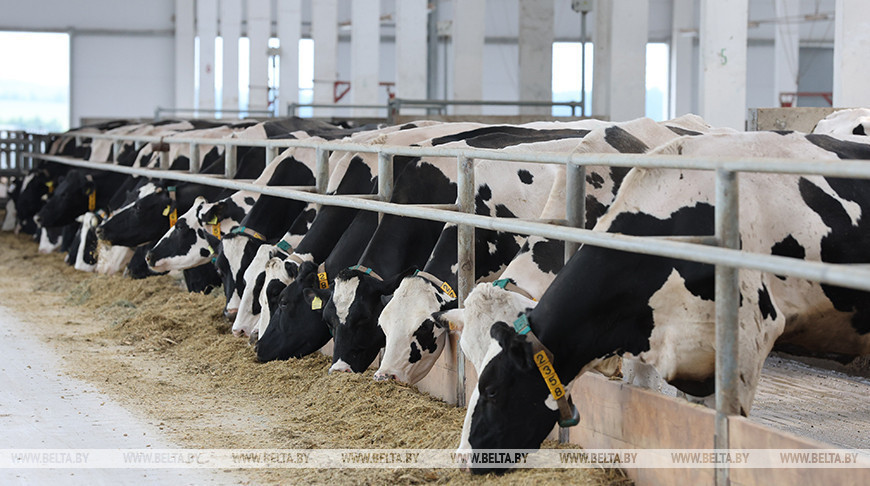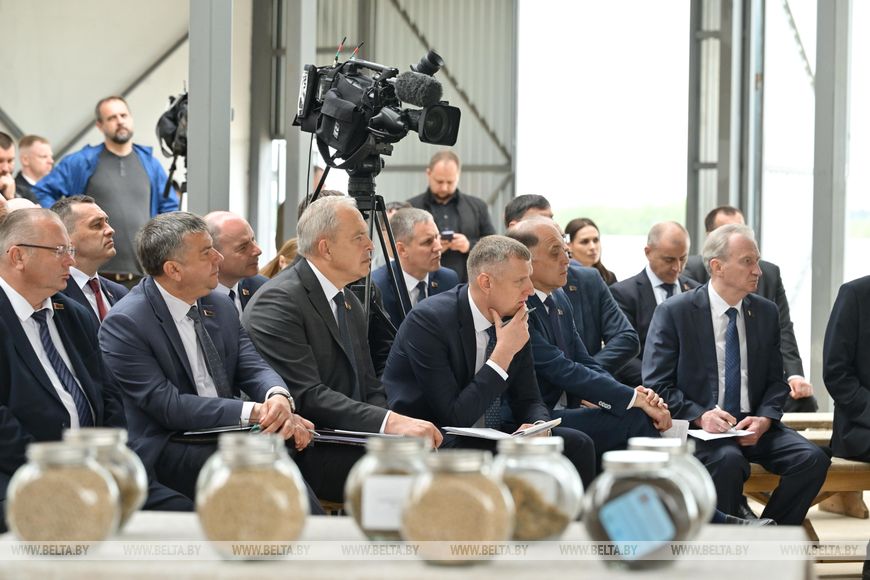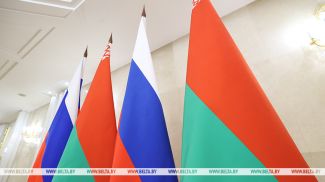
MINSK DISTRICT, 17 June (BelTA) - The possibility of introducing centralized procurement of veterinary vaccines was discussed at an off-site meeting held in Minsk Oblast on 17 June. The meeting was attended by Belarusian President Aleksandr Lukashenko, BelTA has learned.
During the event, Chairman of the Presidium of the National Academy of Sciences of Belarus (NASB) Vladimir Karanik delivered a report on a comprehensive approach to improving cattle welfare and boosting its productivity. It was noted that the situation with cattle loss has somewhat stabilized but remains concerning. In January-May 2025, the mortality rate increased by 1.7% year-on-year. However, the structure of non-productive losses has shifted: while the situation for young cattle has improved in most regions, that for the core herd has worsened.
The NASB head touched upon the factors affecting cattle welfare and presented several proposals to improve the situation.

On vaccination and calf care
To reduce the risk of calf losses at birth, which often occur at night, some farms provide additional payments for employees who stay on duty during these hours.
Among the critical factors influencing cattle health are immune system development in calves and subsequent vaccination. Vladimir Karanik emphasized that vaccines are often used incorrectly. He pointed out that each farm should have a tailored vaccination plan based on its own epizootic situation, but in many cases, these plans are not updated or copied from other farms. Issues such as incorrect vaccination schedules, improper dosage, storage, and transportation result in vaccines losing their effectiveness. To address these challenges, the NASB head proposed that district veterinary stations monitor compliance with vaccine planning and administration.
He also suggested centralized procurement of veterinary vaccines: “I propose considering the possibility of introducing centralized procurement of vaccines at the district or regional level. This would ensure herd protection regardless of a farm’s financial situation or whether it has a veterinarian.” Regarding veterinary specialists, Vladimir Karanik noted that Belarus has a sufficient number of professionals relative to livestock numbers, but stressed the need to better organize their work through centralizing veterinary services so that district veterinary stations can provide comprehensive support across the region.
Deputy Chairman of the Belarusian People’s Congress, president’s authorized representative in Minsk Oblast Aleksandr Kosinets supported the proposal to centralize procurement of veterinary vaccines.
According to the data he presented, Belarus produces only 24 types of veterinary vaccines: 17 at Belvitunifarm and 7 at the Vyshelessky Institute of Experimental Veterinary Medicine, with just over 10 intended for cattle. However, 56 types are imported for cattle, 51 for poultry, and almost the same amount for pigs. The country has 1,455 farms, and each procures vaccines and medications independently, he noted.
"Vaccination in our country should be centralized, but taking into account the specifics of disease incidence at each dairy farm," Aleksandr Kosinets agreed with Vladimir Karanik. He is convinced that it is essential to establish a system to monitor the quality of purchased vaccines.
On the use of PCR laboratories in veterinary medicine
Vladimir Karanik emphasized the importance of preventing and treating infections. “Unfortunately, current laboratory diagnostics of infectious diseases do not fully provide veterinary services with the necessary information. Some diagnostic methods are either outdated or not accurate enough," he explained. For example, when brucellosis tests give positive results, they are often false positives. Establishing an accurate diagnosis can take about a month, during which there is uncertainty about what to do on the farm and how to handle milk (which must be pasteurized).

The NASB head recalled that during the COVID-19 pandemic, by decision of the head of state, Belarus significantly expanded PCR diagnostic laboratory capabilities, enabling rapid antigen detection. "I believe we should now utilize PCR laboratories [of the healthcare sector for veterinary purposes]. We need to establish a PCR diagnostic system that provides results not in a month, but within one to two days," Vladimir Karanik explained. He noted that specialists will soon present proposals to the president on how to improve and modernize veterinary laboratory diagnostics.
On the characteristics of certain cow breeds
The discussion also covered the efficiency of certain cattle breeds. For example, in Belarus, Holstein cows, which are one of the most productive dairy breeds, are widely used, but their high productivity depends on strict adherence to feeding and dietary standards. "We must decide: either we continue intensive use of these cows regardless of available technologies, or we work on genetic diversity," Vladimir Karanik stated. He suggested that for smaller or struggling farms, Danish cattle breeds could be a viable alternative, as they are slightly less productive but more resilient and hardy.
Belarus has been raising Danish Red cattle at the Ustye agricultural enterprise. However, due to various factors, the results have not been entirely successful. In this regard, Vladimir Karanik proposed taking a portion of the herd and testing the breed at one of the leading farms in either Brest Oblast or Grodno Oblast. This would allow for a comparative analysis and help determine the breed’s future prospects.
What did Lukashenko say about the proposed initiatives?
Following the discussion, Aleksandr Lukashenko instructed responsible officials to thoroughly discuss the details and submit agreed proposals to the president for formalization.
“Let's agree that we won't just sit through another meeting on preventing cattle losses, listening to discussions and lectures from scientists, who, of course, speak correctly. We need to make decisions. If, for example, [Belarusian Deputy Prime Minister Yuri] Shuleiko believes that veterinary service centralization is necessary, but [Aleksandr] Kosinets thinks that it is not, they need to reach a consensus and submit a concrete proposal," the president stressed. "If Vladimir Stepanovich [Karanik] believes that we should integrate the healthcare system facilities into diagnostics or other areas, then let's do it, submit proposals. If there are reasonable and well-thought-out ideas, a decision will be made within 24 hours."

Aleksandr Lukashenko approved the proposed approach for further work with the Danish Red cows. "If you want to try keeping 50-60 Danish cows somewhere, then do it. I have no objections. Try it. Think about how to proceed to achieve results.
The president also agreed with the initiative to centralize procurement of veterinary vaccines. As time has shown, market mechanisms do not help solve this problem. On the contrary, concerns about the quality and price of medications purchased by livestock farms are becoming more frequent.
"If we need to centralize [this system], so let's do it. Let's stop all the chatter about markets in this regard. We will not produce enough medicines and vaccines tomorrow. There is hardly a country that produces everything in sufficient quantities: if there is, it is only a few. So the question arises: what we are purchasing - who has checked the quality? If we had been purchasing the high-quality and necessary products, then the results would probably be completely different," the head of state critically remarked.













